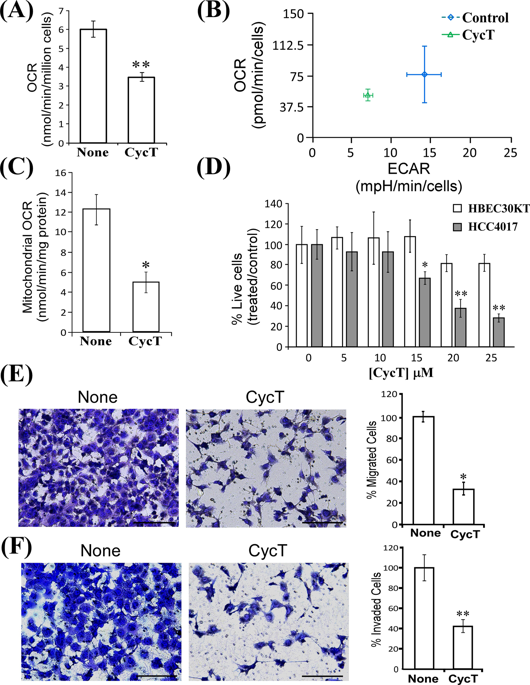Scientific Reports ( IF 3.8 ) Pub Date : 2019-02-05 , DOI: 10.1038/s41598-018-38345-1 Sarada Preeta Kalainayakan 1 , Poorva Ghosh 1 , Sanchareeka Dey 1 , Keely E Fitzgerald 1 , Sagar Sohoni 1 , Purna Chaitanya Konduri 1 , Massoud Garrossian 2 , Li Liu 3 , Li Zhang 1

|
Lung cancer remains the leading cause of cancer-related death, despite the advent of targeted therapies and immunotherapies. Therefore, it is crucial to identify novel molecular features unique to lung tumors. Here, we show that cyclopamine tartrate (CycT) strongly suppresses the growth of subcutaneously implanted non-small cell lung cancer (NSCLC) xenografts and nearly eradicated orthotopically implanted NSCLC xenografts. CycT reduces heme synthesis and degradation in NSCLC cells and suppresses oxygen consumption in purified mitochondria. In orthotopic tumors, CycT decreases the levels of proteins and enzymes crucial for heme synthesis, uptake, and oxidative phosphorylation (OXPHOS). CycT also decreases the levels of two regulators promoting OXPHOS, MYC and MCL1, and effectively alleviates tumor hypoxia. Evidently, CycT acts via multiple modes to suppress OXPHOS. One mode is to directly inhibit mitochondrial respiration/OXPHOS. Another mode is to inhibit heme synthesis and degradation. Both modes appear to be independent of hedgehog signaling. Addition of heme to NSCLC cells partially reverses the effect of CycT on oxygen consumption, proliferation, and tumorigenic functions. Together, our results strongly suggest that CycT suppress tumor growth in the lung by inhibiting heme metabolism and OXPHOS. Targeting heme metabolism and OXPHOS may be an effective strategy to combat lung cancer.
中文翻译:

酒石酸环巴胺,刺猬蛋白信号传导和线粒体呼吸的调节剂,有效地阻止了肺部肿瘤的生长和发展。
尽管靶向疗法和免疫疗法的出现,肺癌仍然是癌症相关死亡的主要原因。因此,鉴定肺肿瘤特有的新分子特征至关重要。在这里,我们显示酒石酸环巴胺(CycT)强烈抑制皮下植入的非小细胞肺癌(NSCLC)异种移植物和几乎根除的原位植入的NSCLC异种移植物的生长。CycT减少了NSCLC细胞中的血红素合成和降解,并抑制了纯化的线粒体中的氧消耗。在原位肿瘤中,CycT降低了血红素合成,摄取和氧化磷酸化(OXPHOS)至关重要的蛋白质和酶的水平。CycT还可以降低促进OXPHOS,MYC和MCL1的两种调节剂的水平,并有效缓解肿瘤缺氧。显然,CycT通过多种模式发挥作用来抑制OXPHOS。一种模式是直接抑制线粒体呼吸/ OXPHOS。另一种模式是抑制血红素的合成和降解。两种模式似乎都独立于刺猬信号。向NSCLC细胞添加血红素可部分逆转CycT对耗氧量,增殖和致瘤功能的影响。总之,我们的结果强烈表明CycT通过抑制血红素代谢和OXPHOS抑制肺中的肿瘤生长。靶向血红素代谢和OXPHOS可能是对抗肺癌的有效策略。向NSCLC细胞添加血红素可部分逆转CycT对耗氧量,增殖和致瘤功能的影响。总之,我们的结果强烈表明CycT通过抑制血红素代谢和OXPHOS抑制肺中肿瘤的生长。靶向血红素代谢和OXPHOS可能是对抗肺癌的有效策略。向NSCLC细胞添加血红素可部分逆转CycT对耗氧量,增殖和致瘤功能的影响。总之,我们的结果强烈表明CycT通过抑制血红素代谢和OXPHOS抑制肺中肿瘤的生长。靶向血红素代谢和OXPHOS可能是对抗肺癌的有效策略。


















































 京公网安备 11010802027423号
京公网安备 11010802027423号